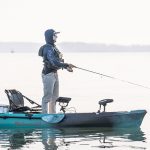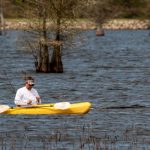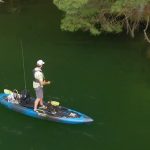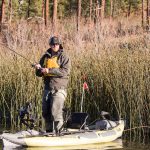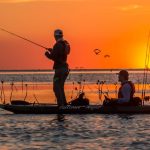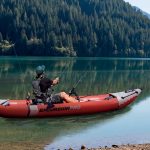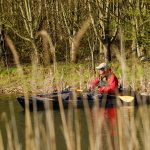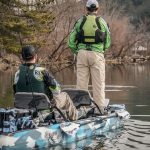As the world of kayak fishing evolves, motorized kayaks are getting wildly popular. We'll discuss the pros and cons of motor powered kayaks and help you pick the best model for your needs!
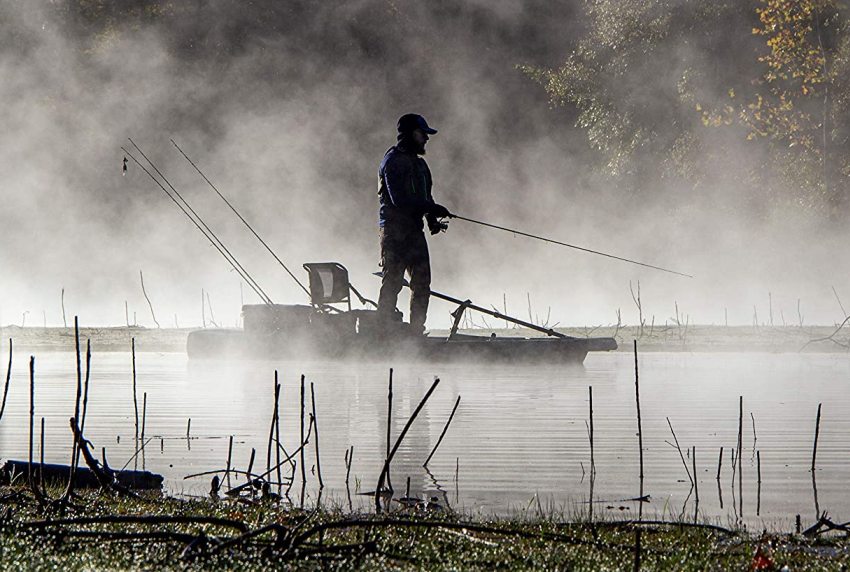
In a hurry? We recommend Perception Outlaw 11.5 as a stable platform for stand-up fishing.
One of the most important characteristics anglers look for in a fishing kayak is stability. Being able to comfortably stand up while you’re fishing opens up lots of possibilities.
After hours of research and testing, we bring you 12 most stable kayaks that we consider the best as a stand-up fishing platform.
At a Glance: Best Stand-up Fishing Kayaks
- Best Overall: Perception Outlaw 11.5
- Best Premium: NuCanoe Unlimited
- Best Budget: Jackson Bite Angler
- Bonafide SS127
- Hobie Mirage Pro Angler 12
- Feelfree Lure 13.5
- Vibe Cubera 120
- Pelican Catch PWR 100
- Sea Eagle FishSUP 126
- Wilderness Systems ATAK 120
- Native Watercraft Ultimate FX 12
- Old Town Sportsman AutoPilot 120
As an affiliate of Amazon and other retailers, we may earn a small commission when you buy via our links, at no additional cost to you. Thank you!
Comparison table: Most Stable Fishing Kayaks
| Model | Specs | Where To Buy |
Perception Outlaw 11.5 | Size: 11’6” x 35” Weight: 77 lbs Capacity: 425 lbs | Amazon |
NuCanoe Unlimited | Size: 12’6” x 41” Weight: 84 lbs Capacity: 650 lbs | Eco Fishing Shop |
Jackson Bite Angler | Size: 11’5” x 36” Weight: 69 lbs Capacity: 400 lbs | Eco Fishing Shop |
Bonafide SS127 | Size: 12’7” x 33.75” Weight: 94 lbs Capacity: 475 lbs | FishUSA |
Hobie Mirage Pro Angler 12 | Size: 12’ x 36” Weight: 128.5 lbs Capacity: 500 lbs | Eco Fishing Shop |
Feelfree Lure 13.5 | Size: 13’6” x 34” Weight: 107 lbs Capacity: 500 lbs | Eco Fishing Shop |
Vibe Cubera 120 | Size: 12’ x 33.5” Weight: 72 lbs Capacity: 475 lbs | Electric Surf Sports |
 Pelican Catch PWR 100 | Size: 9’9” x 39.8” Weight: 75 lbs Capacity: 450 lbs | Bass Pro Shops |
Sea Eagle FishSUP 126 | Size: 12’6” x 40” Weight: 44 lbs Capacity: 500 lbs | Amazon |
Wilderness Systems ATAK 120 | Size: 12’2”x 35” Weight: 86 lbs Capacity: 400 lbs | Amazon |
Native Watercraft Ultimate FX 12 | Size: 12’2” x 30.5” Weight: 65 lbs Capacity: 350 lbs | Native Watercraft |
Old Town Sportsman AutoPilot 120 | Size: 12’ x 37” Weight: 119 lbs Capacity: 558 lbs | Amazon |
Kayaks have traditionally been designed to provide stability for the user while they are in the sitting position.
But since kayak fishing has exploded in popularity, leading kayak brands have been working to produce models that let users stand up and move around as much as they want.
There are two types of kayaks: sit-inside and sit-on-top kayaks. Both of these are designed to provide adequate stability for users while they are seated, but what if you like to stand and fish?
Sit-on-top kayaks are usually the better option as they provide greater primary stability than the sit-inside models. That said, there are sit-inside kayaks in our list below that can let you stand easily.
Tested and Rated: Best Kayaks for Stand-Up Fishing
1. Perception Outlaw 11.5

Length: 11’6” (353 cm)
Width: 35” (89 cm)
Weight: 77 lbs. (35 kg)
Capacity: 425 lbs. (193 kg)
Of all the kayaks we tested, the Perception Outlaw 11.5 is arguably the best stand-up fishing kayak you’ll find in today’s industry. It offers useful features and is designed with all the elements for anglers who prefer to stand while fishing. We love its spacious 35-inch deck that includes traction pads.
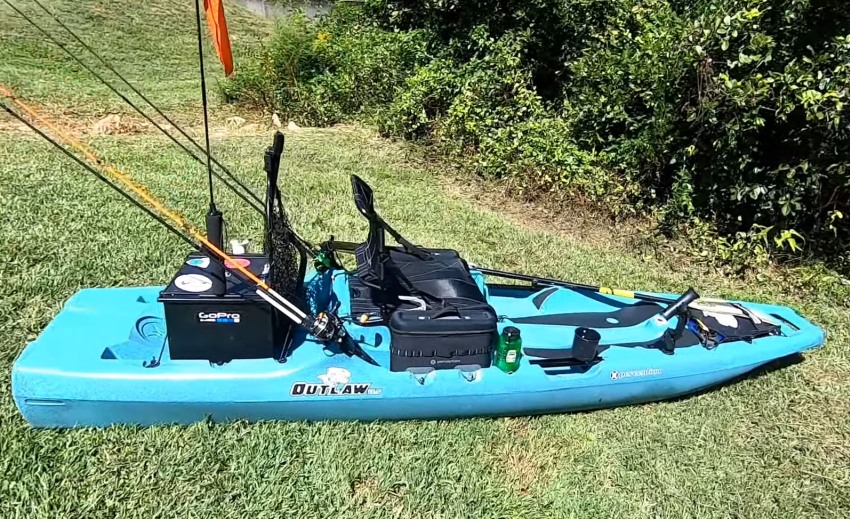
The Outlaw 11.5 comes with an elevated, comfortable seat that makes it easy to stand and sit down. At 11.5 feet long and 77 lbs, it’s a compact kayak that handles quite well on the water in terms of maneuverability and tracking.
Being that wide, the Outlaw is not the fastest kayak around, so if you need to cover a lot of ground, it is not the best choice for you.
One thing we did not like about the Perception Outlaw 11.5 is that it doesn’t offer dry storage compartments. Another potential downside is that this kayak comes with short gear tracks, so if you have a lot of track-mounted gear, it may be a deal breaker for you.
However, this one is a great value that is often priced at under $1,000 in most retail stores.
2. NuCanoe Unlimited

Length: 12’6” (384 cm)
Width: 41” (104 cm)
Weight: 84 lbs. (38 kg)
Capacity: 650 lbs. (294.8 kg)
The NuCanoe Unlimited is packed with useful features and is one of the better-performing kayaks that’s made for stand up fishing. We love its unique hull design that combines the canoe-like ability to glide through the water with the rock-solid stability you get from the wide hull.
The Unlimited is ideal if you plan to install a motor on your kayak. It comes with a transom that can take electric trolling motors and even small gas motors. The bow is compatible with bow-mounted motors, including those with Spot-Lock technologies such us the Motorguide and Minn Kota models.
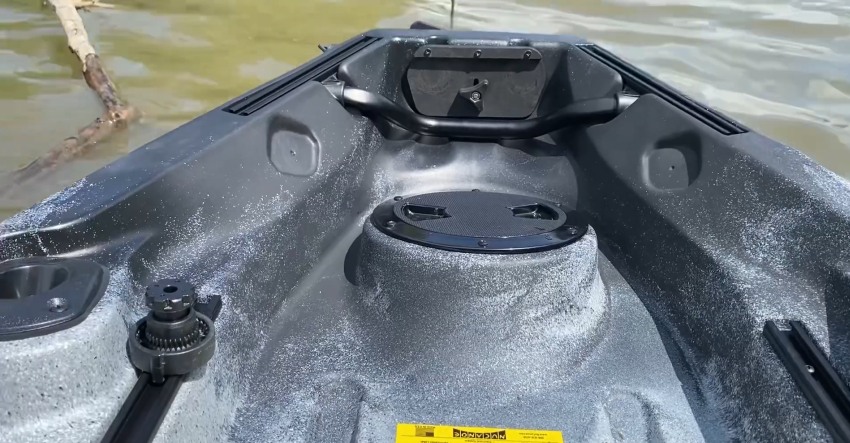
With flush-mounted rod holders and gear tracks that run the length of the entire kayak, there’s almost no limit to the gear you can install on this kayak (it’s not called the Unlimited for nothing).
In our testing, we found the 360 Fusion seat to be exceptionally comfortable. It allows anglers to rotate and face any direction they wish while fishing.
The Unlimited model in NuCanoe’s line is one of the most customizable kayaks on the market that has an incredible 41-inch wide deck that allows you to easily stand up while the boat maintains rock-solid stability.
3. Jackson Bite Angler

Length: 11’5” (350.5 cm)
Width: 36” (91.4 cm)
Weight: 69 lbs. (31.3 kg)
Capacity: 400 lbs. (181.4 kg)
The Jackson Bite Angler is the perfect throw-and-go kayak that packs all the right features you need for a day on the water.
It’s 11.5 feet in length and offers a 36-inch-wide deck that has ample space without any console or center gear hatches getting in the way, making it an awesome fly fishing platform. It is also super-stable and perfect for stand-up fishing.
The Bite Angler comes with a breathable, padded seat that is just a bit lower than some anglers may want.
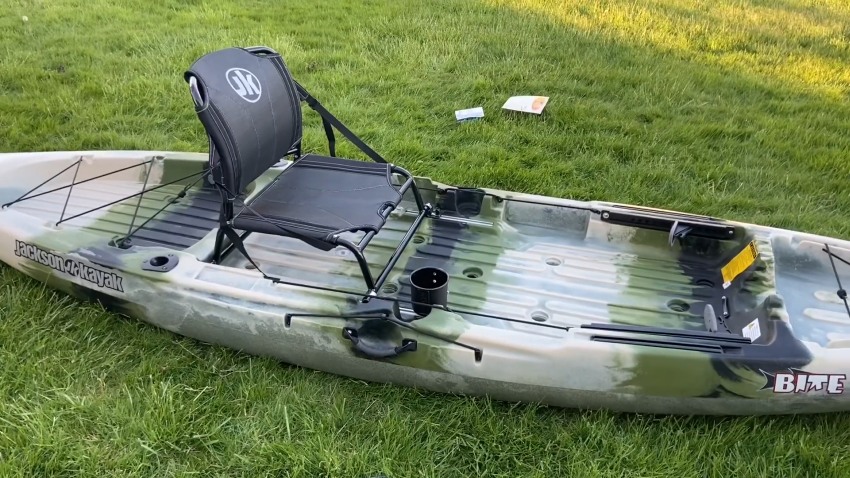
This kayak offers plenty of tackle storage space, as well as large open tank wells on the bow and stern that are equipped with bungee cords to secure your gear.
The Jackson Bite Angler’s hull design provides outstanding stability, making this one a great choice of stand up fishing kayak that’s priced in the sub-$1,000 range.
RELATED: Jackson Kayaks: Model Lineup and Reviews
4. Bonafide SS127

Length: 12’7” (383.5 cm)
Width: 33.75” (85.7 cm)
Weight: 94 lbs. (42.6 kg)
Capacity: 475 lbs. (215.4 kg)
We’ve tested the Bonafide SS127, so we’re speaking from experience here. The Bonafide SS127 is an extremely stable fishing kayak thanks to its hybrid catamaran hull.
The SS127 is only 33.5 inches wide but feels more stable than most kayaks that have a width of 36 inches or more. It offers a sleek, ergonomic design that includes nearly anything you need for fishing.
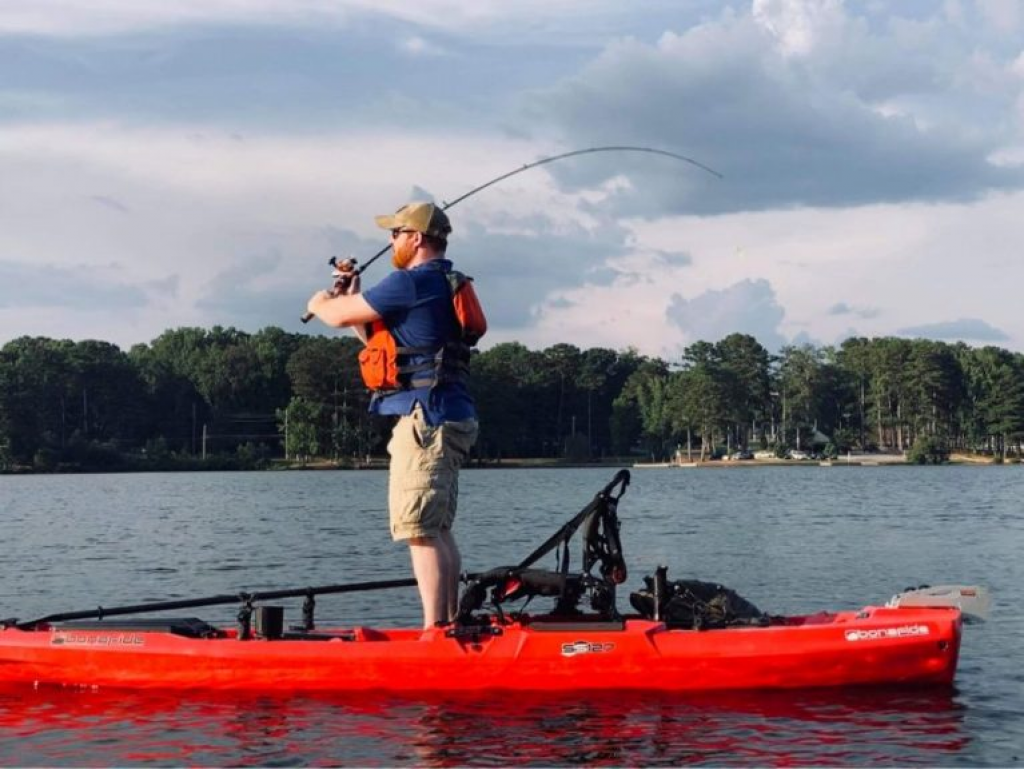
Bonafide’s design experts set out to make this kayak with more ‘fishability’ than any other and definitely hit their mark. The HiRise seating system is very comfortable and can be adjusted into a reclining, low, high or ultra-high position for a truly unique experience.
The Bonafide SS127 is reasonably priced and makes a strong case for being the best stand-up fishing kayak in the industry today.
5. Hobie Mirage Pro Angler 12

Length: 12’ (366 cm)
Width: 36” (91 cm)
Weight: 128.5 lbs. (58.2 kg)
Capacity: 500 lbs. (227 kg)
The Hobie Mirage Pro Angler 12 is easily one of the top kayak models for anglers who require outstanding stability. It’s one that we could place higher on our list, but the price tag far exceeds what most kayak anglers can afford. For those who are willing to invest a sizable amount into an exceptional boat, the Mirage Pro Angler 12 is everything you should expect in a premium fishing kayak.
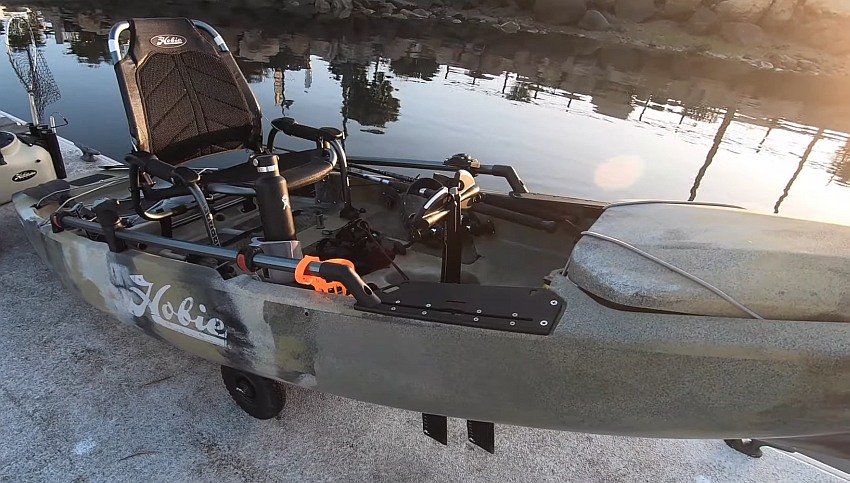
It features an elevated ST seat that’s both comfortable and well-positioned. This kayak has more dry storage compartments than any other and offers a whopping 500 pounds of overall capacity.
The Mirage Pro Angler 12 is made to handle any kind of water and is right at home on calm lakes or choppy coastal waters.
6. Feelfree Lure 13.5

Length: 13’6” (411.48 cm)
Width: 34” (86.36 cm)
Weight: 107 lbs. (48.53 kg)
Capacity: 500 lbs. (227 kg)
The Feelfree Lure 13.5 is an incredibly stable kayak that doesn’t sacrifice much in terms of speed and tracking. The Lure’s 13.5-foot frame offers a 34-inch wide deck that comes with a spacious, padded standing platform. This kayak is nearly everything one could want when it comes to a stable vessel and offers just the right features for serious anglers.
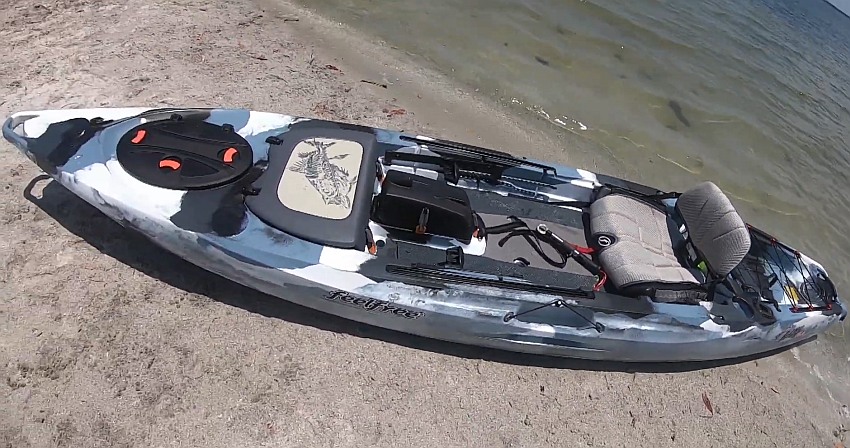
One of our favorite features is the multi-use console that comes with a removable sonar pod.
We also love the Gravity seat, which is exceptionally comfortable. The seat can be adjusted to sit flush with the deck, or 10 inches above it for optimal leg position to stand and sit without any trouble.
The Lure 13.5 is loaded with gear tracks, dry storage, and can even be purchased with an Overdrive Pedal & Motor System.
7. Vibe Cubera 120

Length: 12’ (365.76 cm)
Width: 33.5” (85 cm)
Weight: 72 lbs. (32.65 kg)
Capacity: 475 lbs. (215.45 kg)
The Vibe Cubera 120 is a truly distinct hybrid SUP and stand-up fishing kayak. The flat hull lets it traverse very shallow waters that other boats simply can’t reach. The flat 33.5-inch deck offers plenty of space that can also be customized thanks to 6 top-loading gear tracks. Its flat hull design means this kayak is right at home in calm, flat water such as lakes and slow-moving rivers.
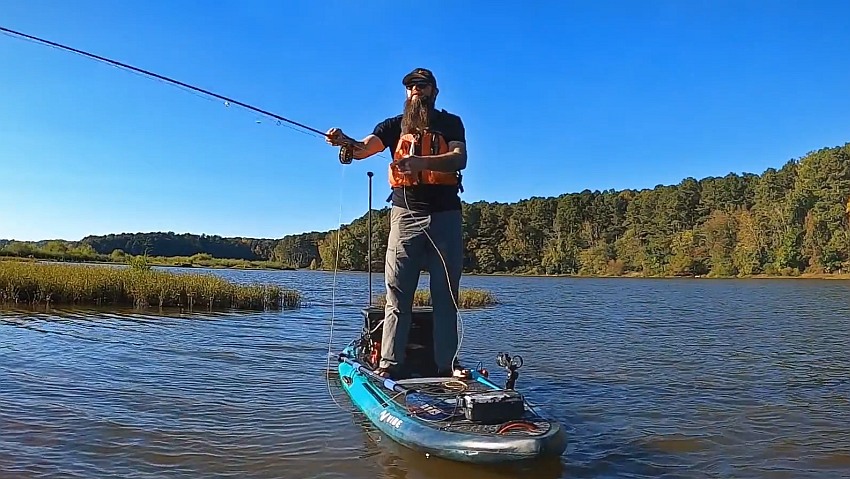
The Vibe Summit Seat is a comfortable height. There’s even a dry hatch for your important gear items on board.
The Cubera also comes with a pre-installed Gravity rudder kit that greatly increases the tracking of this 12-foot stand up fishing kayak.
8. Pelican Catch PWR 100
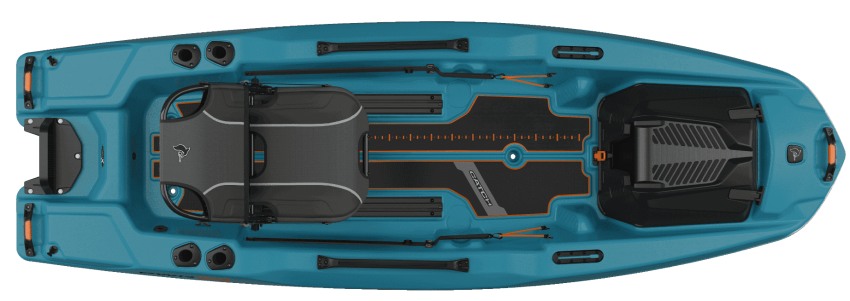
Length: 9’9” (301.7 cm)
Width: 39.8” (101 cm)
Weight: 75 lbs. (34 kg)
Capacity: 450 lbs. (204 kg)
If you’re looking for a super-compact and highly-stable fishing kayak, the Pelican Catch PWR 100 is hard to overlook. This 9’9” kayak is built on a shallow arch hull that’s designed to provide outstanding stability in various kinds of waters. What it lacks in speed, the Catch PWR 100 makes up for in terms of fishing features and a rock-solid stability that lets you comfortably stand and launch cast after cast.
The Pelican Catch PWR 100 is 39.75-inch wide. The kayak offers plenty of space, as well as a padded deck and a large dry storage hatch on the bow section. It weighs just 78 lbs and is highly portable while providing up to 450 pounds of capacity that can easily accommodate all your fishing gear.

The major selling point of the Pelican is the transom. It lets you install an electric trolling motor or even a small gas outboard.
We also love the Ergo360 seat that allows you to swivel and face any direction while fishing.
The Pelican Catch PWR 100 is an unorthodox kayak that is ideal for those who want a compact stand up fishing kayak that’s nearly unbeatable in terms of stability.
See other great Pelican kayaks in our review here.
9. Sea Eagle FishSUP 126

Length: 12’6” (381 cm)
Width: 40” (102 cm)
Weight: 44 lbs. (20 kg)
Capacity: 500 lbs. (227 kg)
The Sea Eagle FishSUP 126 is another highly unique design that offers incredible stability for anglers. It’s the only inflatable kayak we have on our list. The vessel is built with a tapered, swallow-tail shape that’s intended to increase the boat’s maneuverability on the water. It’s extremely portable and lightweight and can be fully inflated in just 7 minutes.

The Sea Eagle FishSUP 126 has a 40-inch hull and offers an astounding 500 pound capacity that can fit a load of fishing gear, or even two anglers at a time.
Just like the Pelican above, the FishSUP comes with a transom bar that allows you to install a trolling motor. And at only 44 lbs, it is the lightest option on our list.
10. Wilderness Systems ATAK 120

Length: 12’2” (371 cm)
Width: 35” (88 cm)
Weight: 86 lbs. (39 kg)
Capacity: 400 lbs. (181 kg)
The Wilderness Systems ATAK 120 is a shorter, more compact version of the popular ATAK 140. This kayak is one of the more feature-rich models that you’ll find for under $2,000 and is an exceptional value considering its on-the-water performance. It’s built on a large, 35-inch frame that includes a wide deck with traction pads.
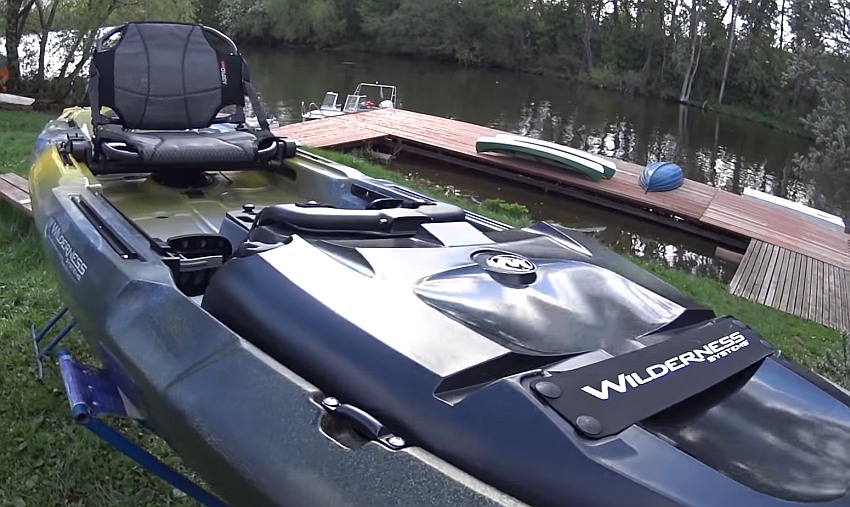
The AirPro Max seat is arguably the most talked-about feature and it also comes with a stand-up assist strap to help maintain balance when standing and sitting.
The ATAK 120 is compatible with Wilderness Systems’ Helix MD Motor Drive electric trolling motor for easy mobility. It’s loaded with features like a removable console, ample dry storage and SlideTrax accessory systems that make it one of the most sought-after stand up fishing kayaks in today’s fishing industry.
11. Native Watercraft Ultimate FX 12

Length: 12’2” (371 cm)
Width: 30.5” (77 cm)
Weight: 65 lbs. (29.5 kg)
Capacity: 350 lbs. (159 kg)
The Native Watercraft Ultimate FX 12 is a unique kayak that blends the stability of a kayak with the agility and speed of a canoe. This 12-foot sit-inside kayak is made with a narrower 30.5-inch width but still manages to provide a level of stability that’s comparable to most of the other models on our list.
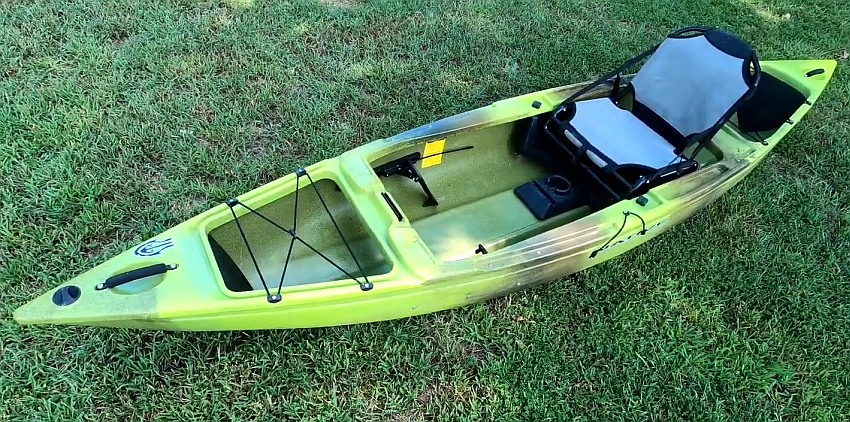
At just 65 pounds, the Native Watercraft Ultimate FX 12 is a true throw-and-go model that can easily be car-topped or secured in the back of a pickup truck to go virtually anywhere you can launch it. It offers a limited amount of features compared to most other kayaks, but what the Ultimate FX 12 lacks in features, it makes up for in performance.
12. Old Town Sportsman AutoPilot 120

Length: 12’ (365.76 cm)
Width: 37” (94 cm)
Weight: 119 lbs. (53.97 kg)
Capacity: 558 lbs. (253.1 kg)
The Old Town Sportsman AutoPilot 120 is a premium-quality boat that has virtually everything you need for comfortable fishing. It’s equipped with a Minn Kota Spot-Lock motor system that makes it possible to travel many miles without having to exert any physical effort in the process. You can even control the motor system using the Bluetooth-connected i-Pilot remote, which lets you sit back and take in the scenery or position your fishing rods to troll for fish while you move.
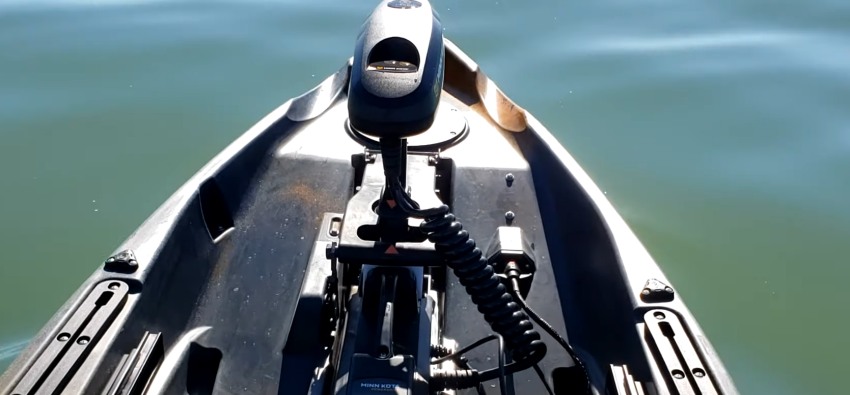
The Sportsman AutoPilot 120 is exceptionally stable. It also offers a whopping 550 pounds of overall capacity, which means you’ll be able to bring along any gear items you want.
It features a very comfortable seating system that can easily be adjusted into a high or low position, as well as a spacious deck that’s fitted with non-slip EVA foam padding for plenty of traction and comfort.
RELATED: Best Trolling Motor Battery: Charge Up Your Kayaking Adventures
The only potential downsides to the Old Town Sportsman AutoPilot 120 are its overall weight of 150 pounds and the high price tag. It’s obviously going to be out of the price range for most novice anglers, but is a worthy investment for serious kayak fishing enthusiasts who want the absolute best quality.
Why Stand in a Kayak? Advantages of Stand-Up Kayaks for Anglers
Standing up in your kayak gives you some serious advantages as opposed to being seated the whole time. If you’re using a sit-inside kayak or a sit-on-top that isn’t very stable, it can be very difficult to stand up.
Having a kayak that allows you to stand up is crucial if you want to maximize your efforts and be a more successful angler. Here are some of the ways that standing up while fishing gives you a significant edge on the water.
Greater Range of Motion
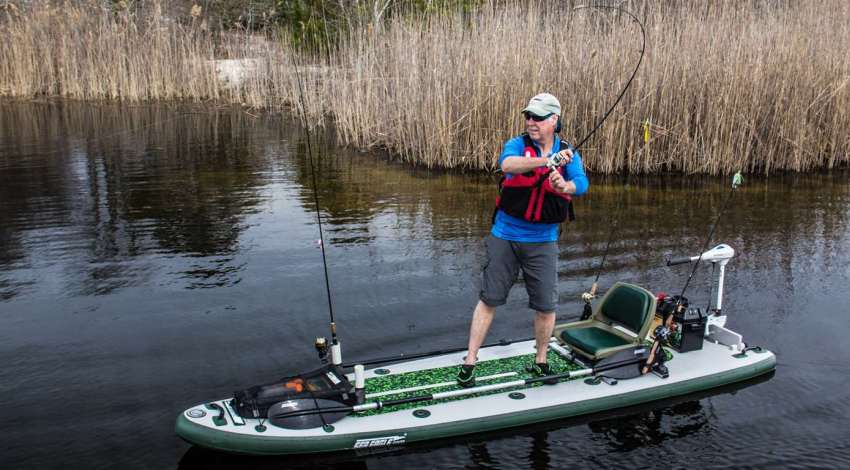
Casting a fishing rod requires you to have a wide, sweeping range of motion. Depending on the type of lure you’re fishing with and its weight and size, the lure can hang down about 2 or 3 feet from the tip of the rod.
If you’re in a seated position, your lure will often touch the water as you’re making your cast. This will severely limit the distance and accuracy you’ll get out of each cast and also presents the risk of snagging your hook on something behind you.
Standing up as you cast will eliminate these issues and give you much more room to cast your rod with proper technique.
Longer, More Accurate Casts
Since you’ll be able to stand up and cast your rod with the right range and motions, you’ll be able to cast much farther while also having greater accuracy as well.
Making a long cast requires you to get as much leverage as possible on the rod, which means you’ll have to bring the rod tip back farther over your shoulder.
Having an extra 3 to 4 feet between your rod and the water’s surface allows you to bring it down more and ‘load up’ more kinetic energy in the rod tip to make a longer cast.
As you put more power into these long casts, it’s also important to have good stability since your weight shifts from backward to forward during the cast.
Being able to stand up also gives you better depth perception. This, combined with the ability to load up more energy in each cast, results in better overall casting accuracy compared to sitting down.
If you’re fishing around structures like trees or docks, accuracy is crucial. Experienced anglers know that more accurate casts equal less potential for snagging your hook on cover and a better chance of catching fish.
Some types of fishing, such as fly fishing, almost always require that you stand while making casts.
Better Visibility
The main reason why most anglers want to stand up as they are fishing is so they can have better visibility on the water.
Sitting down puts your field of view much closer to the water level, but being able to stand up means that there will be less visual distortion caused by the water surface.
Anglers who commonly sight fish for various species know that being at a higher elevation is a major advantage when it comes to being able to see more clearly into the water.
For kayak anglers, standing up gives you the ability to spot fish swimming near your boat.
Having a greater field of view also means that you’ll be able to see any obstacles in the water that you could get your line snagged on. It can also be more favorable than sitting as you’ll be able to see anything that your kayak might run into.
This is very important if you’re using a pedal kayak or motorized propulsion as your propeller or fins can be easily damaged if you were to run into solid objects just below the water’s surface.
Ability to Stretch
If you’ve ever spent much time in a kayak, you know that it doesn’t take long to start feeling a bit cramped if you’re sitting for a few hours. Having the ability to stand up and stretch your legs and back is extremely beneficial if you plan on spending a day or more on the water.
The ability to stand up helps to increase your body’s circulation and also works to reduce the amount of fatigue you might experience from remaining in the seated position for many hours at a time. Just make sure you don’t feel dizzy as you stand up. That’s the last thing you want on a kayak.
What Makes a Good Stand-Up Kayak? Features to Look For
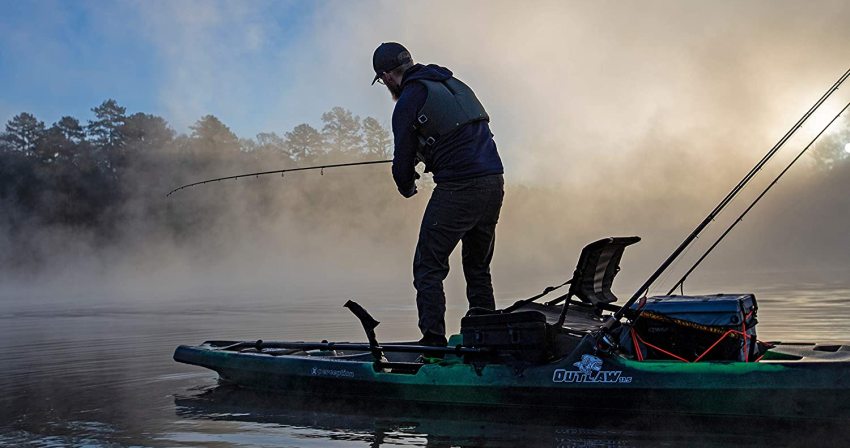
Since there are so many advantages to being able to stand up while fishing, it’s obvious that any serious angler should select a kayak that makes it easy to stand. If you’re searching for a quality kayak that will allow you to confidently stand up, the following design characteristics are the most important things to pay attention to.
Primary Stability
Primary stability is a keyword that you should look for in any kayak’s description. The hull design of any kayak prioritizes either primary or secondary stability. Primary stability refers to the kayak’s ability to remain steady in calm waters while secondary stability is related to the outer portions of the hull near the edge of the kayak and how much weight it will tolerate before tipping over.
Secondary stability is great for kayaks that are going to be used in rough water such as turbulent rivers or on the open ocean where the waves can get choppy. Primary stability is what’s most important in terms of having the ability to stand up in a kayak because it’s what limits the boat from tipping to one side or the other.
Most kayaks are designed to prioritize either good primary or secondary stability, not both at the same time. This means you’ll have to choose a kayak that has one or the other.
Most anglers will be fishing on calm, flat water, which means primary stability is the better choice.
However, if you’re going to travel or fish in areas where the water is more unstable, you might want to select a kayak with greater secondary stability.
RELATED: 10 Best Sea Kayaks for 2023 (Rated and Reviewed)
Width
The width of your kayak is often a good indicator of how much primary stability it’s capable of having. A kayak’s length, width and overall weight are three main factors that affect stability.
A kayak that has more width, or beam, will usually be more stable than a narrow one. While a wide kayak might be much slower than a narrow boat, it will be capable of having better stability.
When searching for a good stand up kayak, it’s recommended to select one that’s at least 31 inches wide or more. Most avid kayak anglers usually opt for a width of 32 to 36 inches or more, regardless of how long the kayak is.
Hull Shape
There are a few different hull shapes and designs you can choose from in a kayak. These include flat, V-shaped, rounded, and pontoon hull designs with each one having its own strengths and weaknesses depending on the type of water you’ll be paddling through.
For stand up kayak fishing, a flat hull is often the best choice, especially if you’re going to be using it on calm water such as ponds, lakes or slow-moving rivers. If there’s a chance that you’ll end up in rough water, it might be better to have a pontoon, V-shaped or rounded hull instead.
A pontoon hull is also a solid choice for the best possible stability. Kayaks with pontoon hulls often have the best combination of primary and secondary stability and are often well-rounded boats that can be used in a variety of environments.
Wide, Open Deck
Being able to comfortably stand up while fishing also requires having ample room to position your feet however you need to.
It’s usually best to go with a kayak that has a spacious deck instead of one that has a center console in the middle or very limited room for your feet.
Having a wide, open deck that’s perfectly flat or one that has padding is great for standing up as it means you’ll have more room to move your feet and balance yourself as needed while fishing.
A spacious deck is always a major asset if you’re fighting a large fish because you’ll have the ability to move around as you struggle to maintain control over your catch.
Having a kayak that allows the seat to flip up and out of the way is an additional bonus as it gives you a bit more room if you require it.
Elevated Seat
Kayaks that have a high or elevated seat are generally considered best for standing up for two main reasons. First, a high seat is much more comfortable since your legs won’t have to bend as much and there also isn’t much pressure on your lower back. Second, it’s much easier to stand up out of a high seat than it will be if you’re sitting down close to the deck.
Any seasoned kayak angler is aware of the fact that an elevated seat is much easier to sit in for hours at a time as opposed to a lower seat. Premium quality kayaks often have seats that can adjust from a comfortable high position to a low setting which allows you to get more leverage when paddling the boat.
Weight Capacity
The overall weight you put inside a kayak will affect its stability as well. If you’re a larger-sized person or you plan to bring along a hefty load of gear, it’s important that you select a kayak that has a higher weight capacity. It’s recommended that you never load a kayak to its full capacity as this will expose you to a higher risk of tipping over.
Instead, try to stay under 75 percent of a kayak’s total weight capacity. This will result in better stability and ensure that you don’t unknowingly overload your boat with extra gear.
Fishing-Specific Features
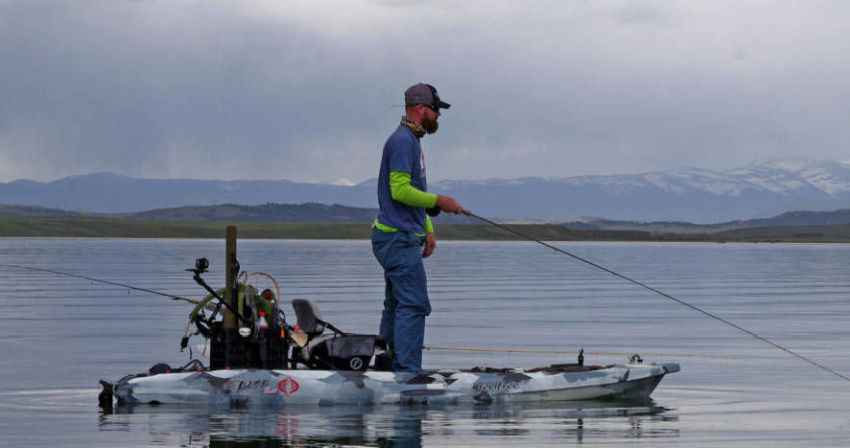
Rod holders
The best fishing kayaks offer both flush-mount rod holders that hold your poles in the upright position and more sophisticated, horizontal rod staging systems with rod tip protectors. If you’re a serious angler, you’re likely to need more than two rods at a time on your kayak for different types of lures and various rigs.
Look for a kayak that will allow you to have customized rod holders as this will let you store and position your rods as you see fit.
Gear Tracks
Gear tracks are the most important feature on a kayak in terms of accessories. These will allow you to mount and position things like fish finders, cameras, GPS units, and other accessories that are needed on a fishing trip.
Premium fishing kayaks often have gear tracks that run the length of the kayak on either side, both in front of and behind the seat, as well as in the middle of the boat. If you have an excess of gear tracks, you’ll be able to maximize the space in your kayak and organize your gear in the best possible way.
Gear Storage
Storage options for your fishing gear can include tank wells, hatches, tackle box compartments, and more. It is important that your gear does not get in the way, but that you’re also able to access certain gear items quickly and easily whenever you need to.
If you have certain gear items that need to be kept dry, make sure the kayak you’re looking at offers plenty of dry storage where those items will fit. It’s important that anglers who typically load their kayaks down with a lot of gear have everything well-balanced so that the stability on their boat isn’t compromised with too much weight in the front or back.
Stand-up Kayak Fishing: Useful Tips
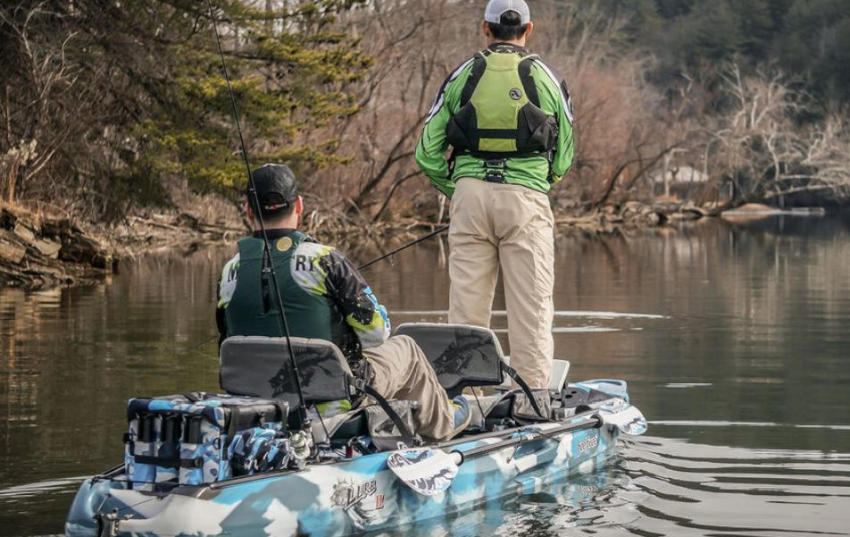
No matter how stable your kayak is, you’ll always be exposing yourself to greater risk by standing up in it. There are specific things you need to do in order to protect yourself from risk and to also preserve your gear in the event that you do tip over.
Many kayak anglers have to learn these lessons the hard way after losing a lot of expensive gear when their kayak happens to tip over, so it’s important that you take the following points into consideration before hitting the water.
Wear Your PFD
Regardless of your experience level, ability to swim, or the stability of your kayak, you should always wear a personal floatation device (PFD) or lifejacket. While most fishing kayaks are made to resist being tipped over, it does happen occasionally and it’s extremely important that you take precautions for such an event.
Never remove your PFD while you’re on the water as you’ll be exposing yourself to a much greater risk of drowning in doing so. Many older lifejackets were large and bulky, which made anglers want to remove them in order to feel less restricted in their movements while fishing. Thankfully, modern PFDs are made to be much less constricting around your body so that you can comfortably wear them while fishing.
Lash Your Gear
Experienced kayak anglers will usually admonish beginners to tie down any loose items on their boat. This is another lesson you don’t want to learn the hard way as failing to do so might result in losing large amounts of expensive gear in an instant if you happen to tip over.
Most stand up fishing kayaks offer bungee cords and other means for you to lash your gear down to the deck. If you have everything on your kayak tightly-secured, you will have better overall stability than if it were loosely placed on the boat.
Keep Your Deck Clutter-Free
Keeping your deck clean and clutter-free is important to kayak anglers for a few reasons. Having less tools, lures, and other items sitting on your deck means you’ll be able to move around more freely if you need to. This is crucial for fighting a hard-pulling fish or if you enter rough, unstable waters because you’ll need as much room as possible to position your feet to maintain balance when standing.
By keeping your deck free of clutter, you’ll also lessen the risk of knocking any loose items off the deck and into the water, never to be seen again.
Improve Your Balance
It’s wise to make any efforts you can to improve your balance while you’re on the water. There are multiple ways you can do this and anglers who like to spend a majority of their time standing up should certainly consider using them.
Some kayaks offer or are compatible with a stand assist strap, which is useful in helping anglers maintain their balance when standing up or sitting down. These can also be useful in helping anglers position themselves in the center of the kayak’s deck if the water is slightly unstable.
Many premium kayaks are made with standing or traction pads on the deck. These pads are made of material that are more comfortable to stand on, but their true purpose is to allow the user’s feet to better grip the deck. Some anglers prefer to be barefoot on their kayak and a standing pad will help them gain traction and lessen the potential that they might slip and lose their balance.
ALSO SEE: 10 Best Kayaking Shoes in 2023: Top Rated Water Shoes, Sandals and Booties

